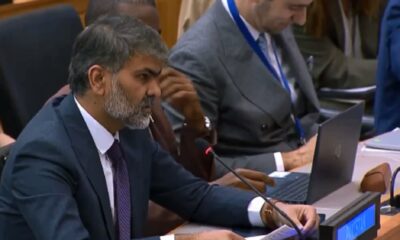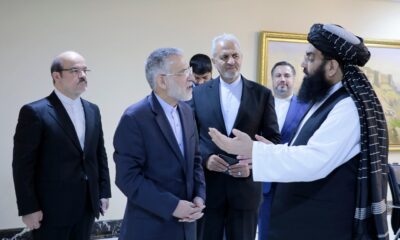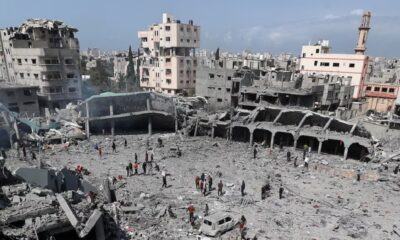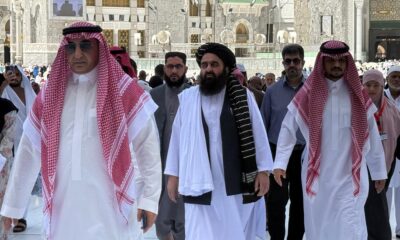World
Turkey faces election runoff, Erdogan seen with momentum
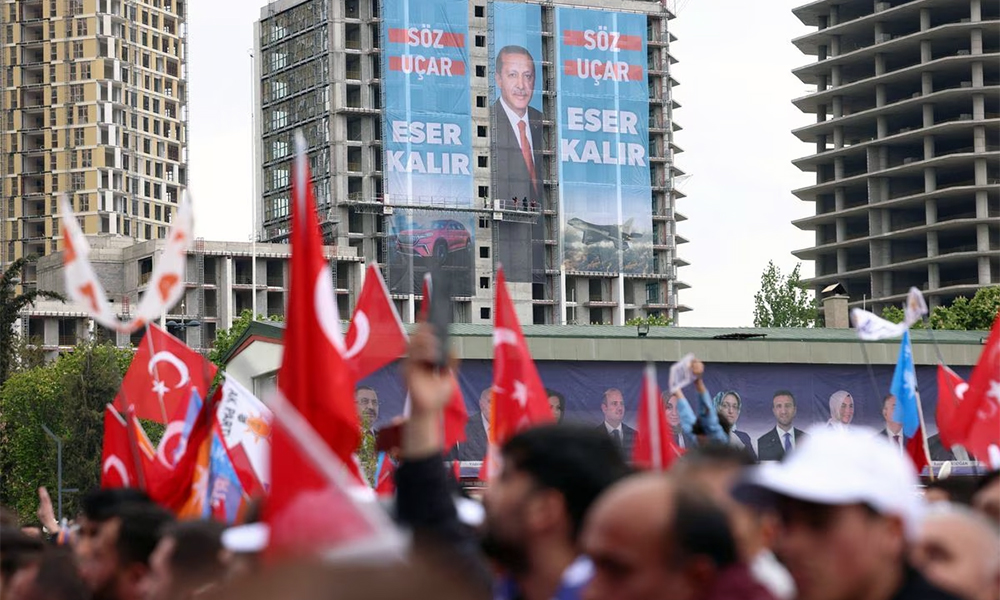
President Tayyip Erdogan led comfortably on Monday after the first round of Turkey’s presidential election, with his rival facing an uphill struggle to prevent the president extending his rule into a third decade in a runoff vote on May 28, Reuters reported.
Turkish assets weakened on the news, which showed Erdogan only just below the 50% threshold needed to avoid sending the NATO-member country to a second round of a presidential election viewed as passing judgment on his autocratic rule.
Erdogan’s People’s Alliance, comprising his Islamist-rooted AK Party and its nationalist partners, also appeared set to win a majority in Turkey’s new parliament with 321 of the 600 seats, further boosting his chances in the presidential runoff.
“The winner has undoubtedly been our country,” Erdogan said in a speech to cheering supporters at the AKP headquarters in the capital Ankara overnight.
With most votes counted in the presidential contest, Erdogan had 49.51% and his main opposition rival Kemal Kilicdaroglu 44.88%, High Election Board chairman Ahmet Yener told reporters. Turnout was a very high 88.8%, read the report.
Further boosting Erdogan’s prospects, nationalist candidate Sinan Ogan, who placed third in Sunday’s election, told Reuters in an interview he would only endorse Kilicdaroglu in the runoff if the latter ruled out any concessions to a pro-Kurdish party, parliament’s third largest.
That party, the HDP, backs Kilicdaroglu but is accused of ties to Kurdish militants, which it denies.
The 2.8 million voters who backed Ogan in the first round could prove crucial for Kilicdaroglu if he is to defeat Erdogan.
Opinion polls had shown Erdogan, 69, trailing Kilicdaroglu, but the outcome suggested that the president and his AK Party were able to rally conservative voters despite a cost-of-living crisis and soaring inflation, Reuters reported.
Kilicdaroglu, head of a six-party alliance, vowed to prevail in the runoff and accused Erdogan’s party of interfering with the counting and reporting of results. He called on his supporters to be patient, but they were downcast on Monday.
“We are sad, we are depressed about the whole situation. We expected different results,” said commuter Volkan Atilgan as he sat near a ferry station in Istanbul. “God willing, we will win this victory in the second round.”
By contrast, Erdogan supporters were jubilant as the results filtered out, with cyber security engineer Feyyaz Balcu, 23, confident that Erdogan could fix Turkey’s economic woes.
“It is very important for all Turkish people that Erdogan wins the elections. He is a world leader and all the Turks and Muslims want Erdogan as president,” he said.
The prospect of five more years of Erdogan’s rule will upset civil rights activists campaigning for reforms to undo the damage they say he has done to Turkey’s democracy. He says he respects democracy.
Thousands of political prisoners and activists could be released if the opposition prevails, Reuters reported.
Stocks fell, the lira was near a two-month low, sovereign dollar bonds fell and the cost of insuring exposure to Turkey’s debt spiked. Analysts voiced concern about the uncertainty and diminishing prospects of a return to economic policy orthodoxy.
“Erdogan has now a clear psychological lead against the opposition,” said Teneo co-president Wolfango Piccoli. “Erdogan will likely double down on his national security focused narratives over the next two weeks.”
The election has been closely watched in Europe, Washington, Moscow, and across the region, where Erdogan has asserted Turkish power while strengthening ties to Russia and putting strain on Ankara’s traditional alliance with the United States, Reuters reported.
Erdogan has cordial relations with President Vladimir Putin and his strong showing is likely to encourage the Kremlin but unnerve the Biden administration, as well as many European and leaders who had troubled ties with Erdogan.
White House spokesperson John Kirby said President Joe Biden was looking forward to working with whoever won the vote. The Kremlin said it expected Russia’s cooperation with Turkey to continue and deepen whoever wins.
Analysts saw Middle Eastern governments preferring continuity over change after Erdogan’s showing, regarding him as part of an acceptable status quo in a tumultuous region.
The opposition had expected to benefit from voter anger at economic woes after an unorthodox policy of low interest rates triggered a lira crisis and soaring inflation. A slow government response to earthquakes that killed 50,000 people in February had also been expected to influence voters.
Kilicdaroglu, 74, has pledged to revive democracy after years of state repression, return to orthodox economic policies, empower institutions that lost autonomy under Erdogan and rebuild frail ties with the West, read the report.
The political uncertainty is expected to weigh on financial markets over the next two weeks. The lira stood at 19.67 to the dollar at 1348 GMT, after reaching 19.70 in earlier trading, its weakest since a record low of 19.80 hit in March.
The cost of insuring against Turkey defaulting on its sovereign debts surged to a six-month high, jumping 105 basis points (bps) from Friday’s levels to 597 bps, according to S&P Global Market Intelligence, Reuters reported.
World
As Iran tensions build, US military moves warplanes to reinforce Middle East
U.S. President Donald Trump threatened Iran on Sunday with bombing and secondary tariffs if Tehran did not come to an agreement with Washington over its nuclear program.

U.S. Defense Secretary Pete Hegseth has reinforced U.S. military capability in the Middle East with more warplanes, the Pentagon said on Tuesday, amid a more than two-week-old U.S. bombing campaign in Yemen and mounting tensions with Iran, Reuters reported.
The Pentagon’s brief statement did not specify which aircraft were being deployed or where precisely they were sent.
However, as many as six B-2 bombers have relocated in the past week or so to a U.S.-British military base on the Indian Ocean island of Diego Garcia, according to U.S. officials, speaking on condition of anonymity.
Experts say that puts the B-2s, which have stealth technology and are equipped to carry the heaviest U.S. bombs and nuclear weapons, in an ideal position to operate in the Middle East.
“Should Iran or its proxies threaten American personnel and interests in the region, the United States will take decisive action to defend our people,” Pentagon spokesperson Sean Parnell said in a statement.
The U.S. military’s Strategic Command has declined to say how many B-2s have reached Diego Garcia and noted that it does not comment on exercises or operations involving the B-2.
There is already considerable firepower in the Middle East and the U.S. military will soon have two aircraft carriers in the region, read the report.
U.S. President Donald Trump threatened Iran on Sunday with bombing and secondary tariffs if Tehran did not come to an agreement with Washington over its nuclear program.
While B-2 bombers have been employed to strike buried Houthi targets in Yemen, most experts say use of the stealthy bomber is overkill there and the targets aren’t buried so deeply.
However, the B-2 is equipped to carry America’s most potent bomb — the 30,000-pound GBU-57 Massive Ordnance Penetrator. That is the weapon that experts say could be used to strike Iran’s nuclear program.
There are only 20 B-2 bombers in the Air Force’s inventory so they are usually used sparingly.
Iran’s Supreme Leader Ayatollah Ali Khamenei said on Monday the U.S. would receive a strong blow if Trump followed through with his threats.
Revolutionary Guards Aerospace Commander Amirali Hajizadeh threatened U.S. forces in the Middle East, noting American bases in the Middle East and adding: “They are in a glass house and should not throw stones.”
One official told Reuters that the U.S. military was also moving some air defense capabilities from Asia to the Middle East.
In his 2017-2021 term, Trump withdrew the U.S. from a 2015 deal between Iran and world powers that placed strict limits on Tehran’s disputed nuclear activities in exchange for sanctions relief. Trump also reimposed sweeping U.S. sanctions.
Since then, Iran has far surpassed that deal’s limits on uranium enrichment.
Western powers accuse Iran of having a clandestine agenda to develop nuclear weapons capability by enriching uranium to a high level of fissile purity, above what they say is justifiable for a civilian atomic energy program. Tehran says its nuclear program is wholly for civilian energy purposes.
World
Israel kills Hezbollah official in deadly Beirut airstrike

An Israeli airstrike killed four people including a Hezbollah official in Beirut’s southern suburbs on Tuesday, a Lebanese security source said, further testing a shaky ceasefire between Israel and Iran-backed Hezbollah.
The Israeli military said the official – Hassan Bdeir – was a member of a Hezbollah unit and Iran’s Quds Force, and he had assisted the Palestinian group Hamas in planning a “significant and imminent terror attack against Israeli civilians,” Reuters reported.
The Lebanese security source said the target was a Hezbollah figure whose responsibilities included the Palestinian file. The Lebanese health ministry said the strike killed four people – including a woman – and wounded seven others.
It marked Israel’s second airstrike in the Hezbollah-controlled suburb of Beirut in five days, adding to strains on the U.S.-brokered ceasefire that ended last year’s devastating conflict.
The attacks on Beirut’s southern suburbs have resumed at a time of broader escalation in the region, with Israel having restarted Gaza strikes after a two-month truce and the United States hitting the Iran-aligned Houthis of Yemen in a bid to get them to stop attacking Red Sea shipping.
Hezbollah lawmaker Ibrahim Moussawi said the Israeli attack amounted to “a major and severe aggression that has escalated the situation to an entirely different level”.
Speaking in a televised statement after visiting the building that was struck, he called on the Lebanese state to “activate the highest level of diplomacy to find solutions”.
Israeli Foreign Minister Gideon Saar said the eliminated Hezbollah operative posed “a real and immediate threat”. “We expect Lebanon to take action to uproot terrorist organizations acting within its borders against Israel,” he said.
Israel dealt severe blows to Hezbollah in the war, killing thousands of its fighters, destroying much of it arsenal and eliminating its top leadership including Hassan Nasrallah.
Hezbollah has denied any role in recent rocket attacks from Lebanon towards Israel, including one that prompted Israel to carry out an airstrike on the southern suburbs last Friday.
Tuesday’s strike in the early hours appeared to have damaged the upper three floors of a building, a Reuters reporter at the scene said, with the balconies of those floors blown out.
The glass on the floors below was intact, indicating a targeted strike. Ambulances were at the scene as families fled to other parts of Beirut.
There was no advance warning, in contrast to the attack on Friday when the Israeli military announced which building it intended to hit and ordered residents to leave the area.
Lebanese President Joseph Aoun condemned the latest airstrike, calling it a “dangerous warning” that signals premeditated intentions against Lebanon, which would intensify diplomatic outreach and mobilise international allies.
Lebanese Prime Minister Nawaf Salam said the strike was a flagrant breach of a U.N. Security Council Resolution upon which the ceasefire was based, and the ceasefire arrangement.
U.S. BACKS ISRAEL
The ceasefire agreement demanded that southern Lebanon be free of Hezbollah fighters and weapons, that Lebanese troops deploy into the area, and that Israeli troops withdraw.
But each side accuses the other of failing to implement the terms fully. Israel says Hezbollah still has infrastructure in the south, while Lebanon and Hezbollah say Israel is occupying Lebanese soil by not withdrawing from five hilltop positions.
The U.S. State Department said that Israel was defending itself from rocket attacks that came from Lebanon and that Washington blamed “terrorists” for the resumption of hostilities.
“Hostilities have resumed because terrorists launched rockets into Israel from Lebanon,” a State Department spokesperson said in an email, responding to a question from Reuters seeking reaction to Tuesday’s airstrike. Washington supported Israel’s response, the spokesperson said.
The Israel-Hezbollah conflict was ignited when Hezbollah opened fire in support of Hamas at the start of the Gaza war. It escalated in September when Israel went on the offensive, declaring the aim of securing the return home of tens of thousands of people evacuated from homes in the north.
The war uprooted more than a million people and killed at least 3,768 people in Lebanon, according to a Lebanese health ministry toll from November. Dozens more have been reported killed by Israeli fire since the ceasefire.
Lebanon’s figures do not distinguish between civilians and fighters.
During the war, Hezbollah strikes killed 45 civilians in northern Israel and the Israeli-occupied Golan Heights. At least 73 Israeli soldiers were killed in northern Israel, the Golan Heights, and in combat in southern Lebanon, according to Israeli authorities.
World
Trump says Zelenskiy wants to back out of critical minerals deal

U.S. President Donald Trump said on Sunday Ukrainian President Volodymyr Zelenskiy wants to back out of a critical minerals deal, warning the Ukrainian leader would face big problems if he did.
“He’s trying to back out of the rare earth deal and if he does that he’s got some problems, big, big problems,” Trump told reporters.
“He wants to be a member of NATO, but he’s never going to be a member of NATO. He understands that.”
(Reuters)
-

 Latest News5 days ago
Latest News5 days agoAfghanistan’s reconstruction is in the interest of EU: Uzbek president
-

 Latest News4 days ago
Latest News4 days agoMinistry of Economy calls on US to release Afghanistan’s frozen funds
-

 Latest News5 days ago
Latest News5 days agoUS won’t rest until all Americans detained in Afghanistan brought home: Rubio
-

 Latest News5 days ago
Latest News5 days agoBulgaria brings five people to trial over deaths of 18 Afghan migrants
-

 Latest News4 days ago
Latest News4 days agoPakistan ‘extends’ deadline for a week for Afghans to leave the country
-

 Regional5 days ago
Regional5 days agoChina launches military drills around Taiwan, calls its president a ‘parasite’
-

 Business5 days ago
Business5 days agoGold climbs to record high as tariff worries bolster safe-haven demand
-

 Sport4 days ago
Sport4 days agoIPL 2025: Batters in race for prestigious Orange Cap


